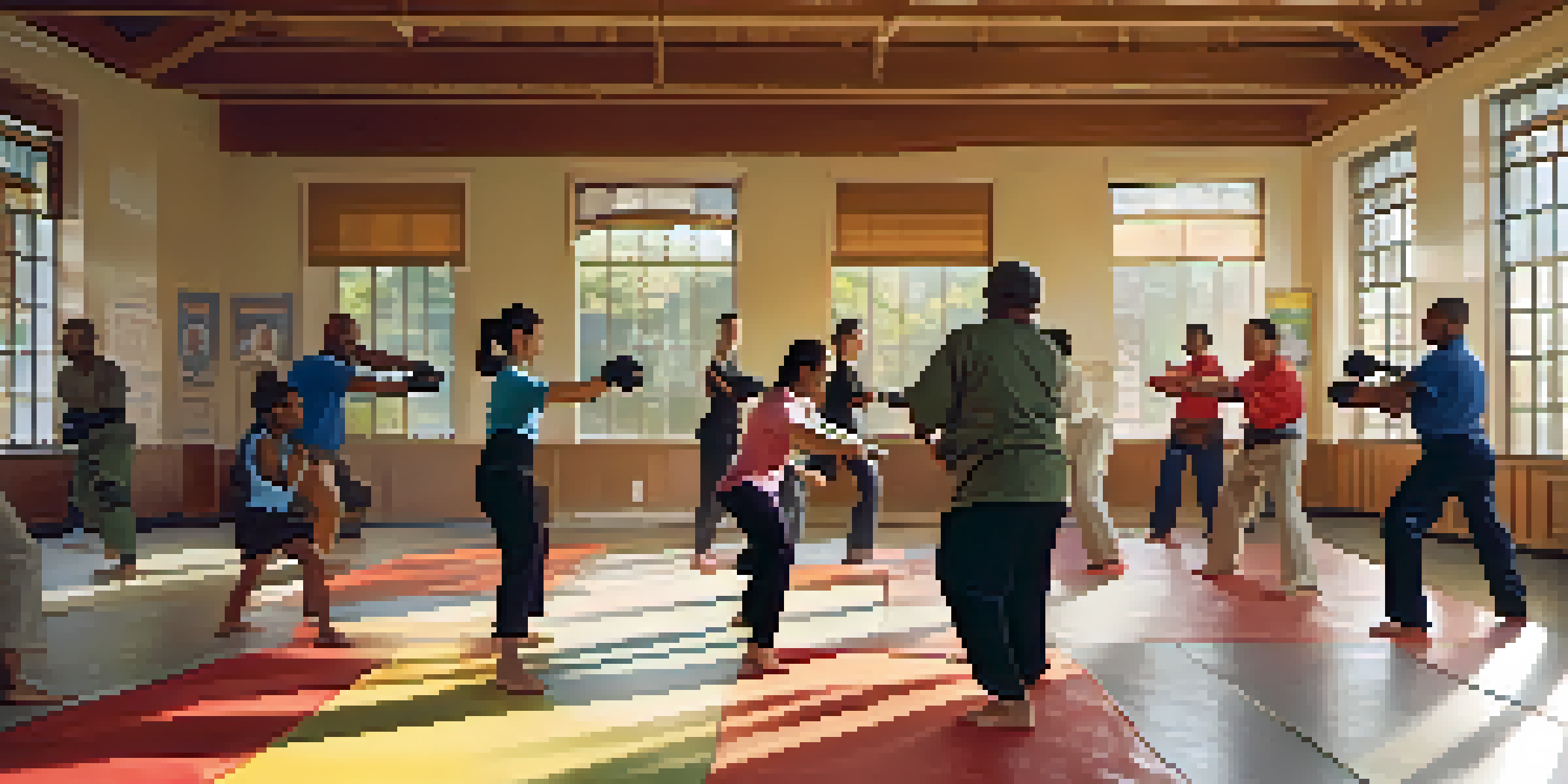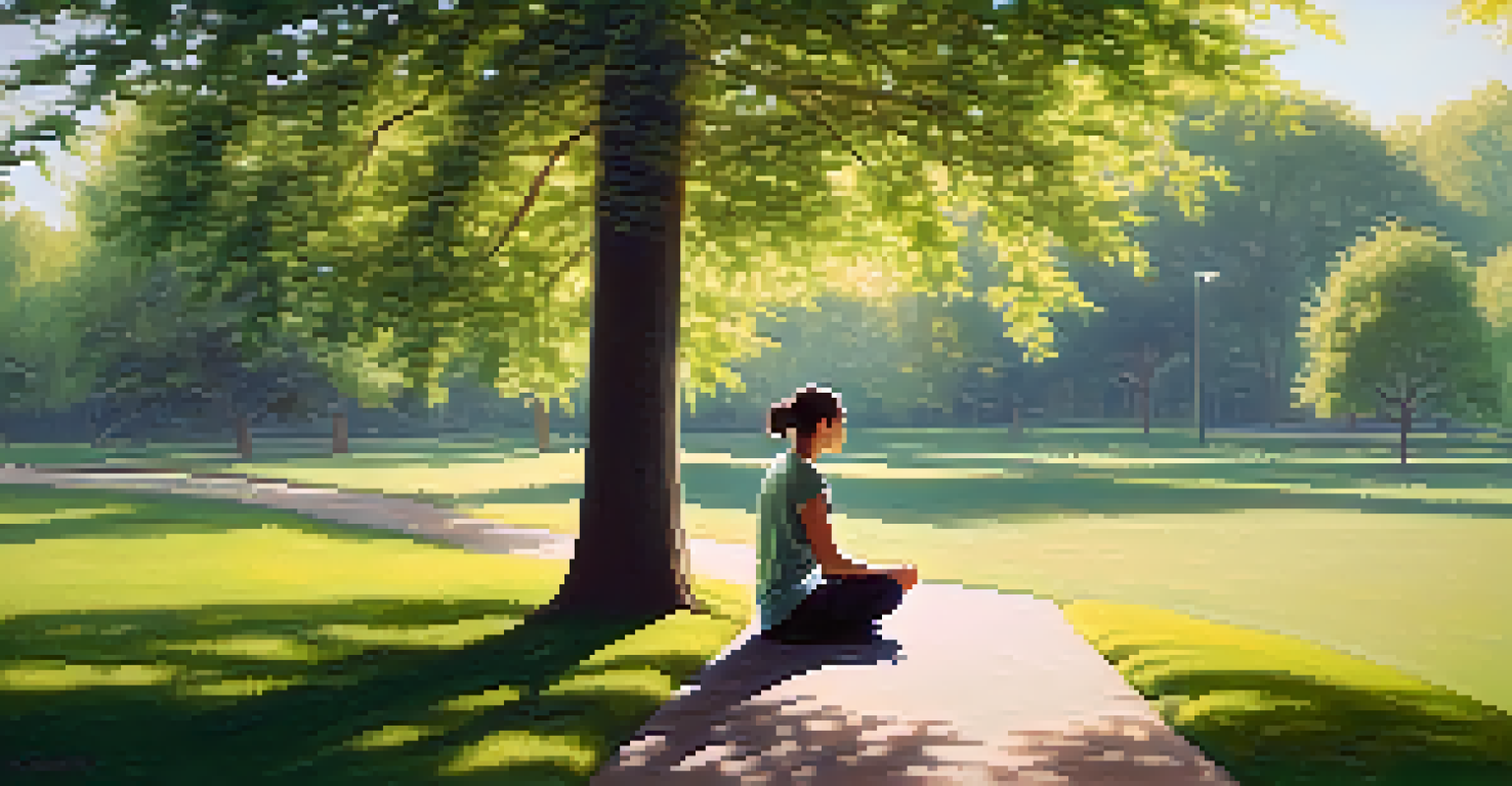Incorporating Self-Defense Techniques into Everyday Life

Understanding the Importance of Self-Defense
Self-defense is more than just a physical skill; it's about empowerment. Knowing how to protect yourself can boost your confidence and help you feel more secure in various situations. It’s not only about physical confrontations but also about being aware of your surroundings and having the mental tools to handle threats.
The best defense is a good offense.
Many people think self-defense training is only for those in high-risk environments, but the truth is that anyone can benefit from it. Whether you're walking home alone at night or simply navigating a busy street, having self-defense skills can make a significant difference. It's all about being prepared and knowing what to do when unexpected situations arise.
Incorporating self-defense techniques into your daily life doesn’t require you to become a martial arts expert. Simple strategies can enhance your safety and awareness, allowing you to navigate the world with greater assurance.
Developing Situational Awareness
Situational awareness is the ability to recognize and understand your environment. It involves being alert to what’s happening around you and assessing potential threats. This skill is crucial in avoiding dangerous situations before they escalate, making it a foundational aspect of self-defense.

To develop this skill, start by paying attention to your surroundings. Look for exits, observe the behavior of others, and trust your instincts. If something feels off, it probably is. Practicing situational awareness can make you a less appealing target for potential threats, as you appear more confident and alert.
Self-Defense Empowers Individuals
Learning self-defense boosts confidence and prepares you for unexpected situations.
You can also incorporate mindfulness practices into your daily routine, which can enhance your focus and awareness. Simple techniques such as deep breathing or taking a moment to assess your surroundings can be effective in developing this essential skill.
Basic Self-Defense Techniques Everyone Should Know
You don't need to master complex martial arts to protect yourself. There are basic self-defense techniques that everyone can learn and practice. Simple moves like how to break free from a wrist grab or how to deliver a strong knee strike can be incredibly effective in a dangerous situation.
Self-defense is not just a right, it's a responsibility.
Consider enrolling in a self-defense class that focuses on practical techniques for everyday situations. Many community centers and gyms offer classes designed for beginners. These classes not only teach you physical techniques but also how to remain calm and think critically in stressful situations.
Practicing these techniques regularly can help you build muscle memory, making it easier to react instinctively when needed. Remember, the goal isn’t to become a fighter but to empower yourself to defend against potential threats.
Creating a Personal Safety Plan
A personal safety plan is a proactive approach to ensuring your safety in various scenarios. This plan should detail what you would do if confronted by a threat, outlining safe routes to take, emergency contacts, and strategies for different situations. Having a plan in place can help you feel more secure and prepared.
Start by assessing your daily routine and identify potential risks. Think about the times you feel most vulnerable and develop strategies to mitigate those risks. For instance, if you often walk home at night, consider walking with a friend or using well-lit paths.
Situational Awareness is Key
Being aware of your surroundings helps you identify potential threats and avoid danger.
Regularly review and update your safety plan to adapt to changes in your routine or environment. A well-thought-out safety plan can provide peace of mind and empower you to face the world with confidence.
Using Technology to Enhance Safety
In today's digital age, technology can play a vital role in personal safety. From safety apps that alert friends or family when you’re in danger to GPS trackers that share your location, there are numerous tools available to help keep you safe. Embracing these technologies can add an extra layer of security to your daily life.
Consider using apps that allow you to check in with loved ones when you're out late or that can send emergency alerts with your location. Some apps even have features that allow you to record incidents for safety documentation.
While technology is helpful, it’s essential to use it wisely. Ensure that your devices are charged and that you know how to use the features available to you. A combination of technology and personal awareness can significantly enhance your safety.
Practicing Self-Defense with Friends and Family
One of the best ways to incorporate self-defense techniques into your life is to practice with friends and family. This not only makes learning more enjoyable but also allows you to build a support system focused on safety. You can organize regular practice sessions to reinforce skills and review your personal safety plans together.
Engaging others in your self-defense journey can also help demystify the techniques, making them less intimidating. You might even inspire your friends and family to become more proactive about their safety, creating a ripple effect in your community.
Mental Preparedness Matters
Cultivating a confident mindset enhances your ability to respond effectively in threatening situations.
Remember, self-defense is about creating a mindset of awareness and preparedness. By involving your loved ones, you create a network of support that can empower everyone to feel safer.
The Mental Aspect of Self-Defense
Self-defense isn’t just about physical techniques; mental preparedness is equally important. Cultivating a mindset that prioritizes safety and confidence can significantly affect how you respond in potential threats. Visualization techniques can help you mentally rehearse how you would react to various situations, increasing your chances of responding effectively.
Additionally, understanding the psychological aspects of conflict can help you remain calm and composed during stressful encounters. Techniques such as deep breathing can help reduce anxiety and improve your focus, allowing you to think clearly in challenging situations.

Emphasizing the mental side of self-defense can transform how you approach your overall safety strategy. By preparing yourself mentally, you can face the world with confidence and poise, essential qualities in any self-defense scenario.